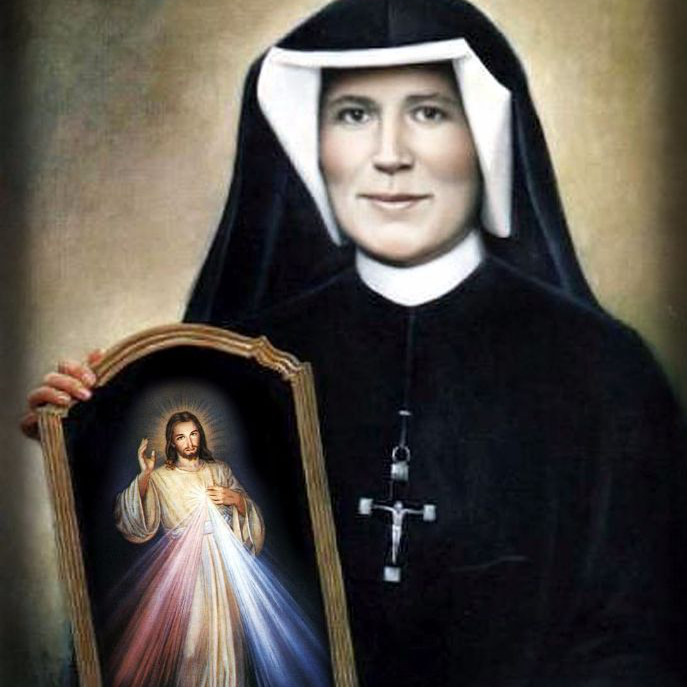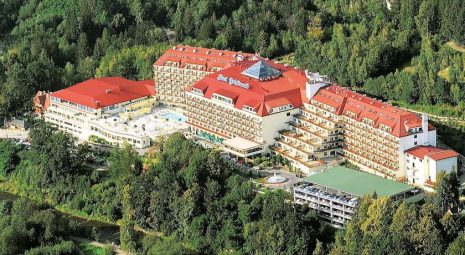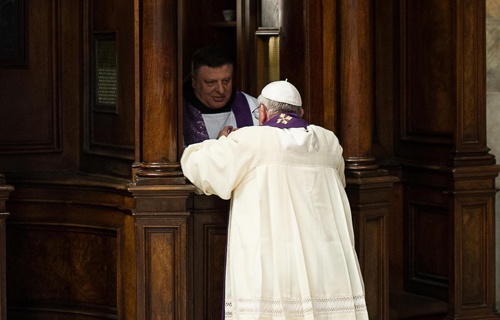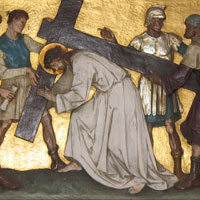Following the rigorous privations of World Youth Day in Kraków — and they were rigorous — the 300 or so Victorian pilgrims converged on the beautiful mountain hamlet of Wisła.
For a couple of days we lived like kings, enjoying rest and recuperation at the very plush Hotel Gołębiewski. It’s officially a four star hotel, but to my mind it’s closer to five stars, and certainly the most comfortable hotel I’ve stayed in.
Nonetheless, that timeless WYD motto was still in effect: “we are pilgrims, not tourists.” Our task in the days immediately after World Youth Day was to pray, reflect, and journal. Our days in Wisła constituted a spiritual retreat, not a holiday. I was invited to preach the first meditation, on the evening of our arrival. What follows is very long (I had a 30 minute time slot to fill!), but the theme of the meditation — interior silence — applies to us all, young and old, pilgrim or not.
Introduction
As we sit here, for the next 30 minutes or so, you’re invited to pray. You can pray by meditating on my words, or you can pray by blocking out my voice and formulating your own prayer.
During our pilgrimage, Bishop Mark has often repeated a wise saying, which echoes the saints:
“Pray as you can, not as you ought.”
In other words, let the Holy Spirit be your guide during our days here. And enjoy your days here, in the lap of luxury! You know you’re onto a good thing when you walk into a hotel foyer, and it feels likes you’ve boarded the Titanic.
I think if anyone here receives an upgrade at the airport, and flies back to Australia in business class — compared to this hotel, you’re slumming it.
But these are the perfect circumstances, I think, for transition. We’ve already moved from one extreme to another: from privation and physical exertion, to luxury and comfort. And we’re preparing to move from the unique and exceptional circumstances of this pilgrimage, back to the routine of daily life in Australia.
Our challenge is to find continuity. As Cardinal Stanislaus told us at the Opening Mass, the Holy Spirit is posing three questions, and it’s our task to seek the answers:
First, where have we been?
Second, where are we now?
Third, where are we going, and what are we taking with us?
Asking and answering these questions is the purpose of the next few days. And I don’t think our present comfort and luxury is a hindrance. On the contrary, it’s a great help. If we can find some continuity between Kraków and Wisła — despite the radically different conditions — then we can also find continuity between our pilgrimage and life back at home — despite the radically different conditions.
The power of silence
I wonder how many heard what I heard at Campus Misericordia, a few hours before the pope joined us? One of the MCs remarked something like this:
Pope Francis wants to make the world a better place. But he doesn’t want to do it alone. He needs the young people of the world to join in. His dream is for us together to make the world a better place.
In and of itself, I guess this isn’t a bad statement, but at the time I thought to myself, “that’s wrong.” I thought Pope Francis would put it differently. He’d point us to Christ. He’d tell us Christ has already made the world a better place. The world doesn’t need anymore messiahs; the world needs disciples.
Sure enough, a few hours later, that is what he said to us:
As he did at Pentecost, the Lord wants to work one of the greatest miracles we can experience; he wants to turn your hands, my hands, our hands, into signs of reconciliation, of communion, of creation.
He wants your hands to build the world of today, and he wants to build that world with you.
This is our commission. And it doesn’t come from the pope. It comes from Christ himself, via the pope.
The Holy Father said something else at Saturday’s Vigil. And at Sunday’s Mass. Or rather, he did something. He called for prayerful silence. And we obliged. And wasn’t it powerful?
There’s great power in prayerful silence. Physically. Mentally. Spiritually. That’s what I propose we recapture tonight, and in the days we are here.
A stillness prayer
So in that spirit, I’m going to stop talking for a moment, and we’ll very deliberately meditate on the present moment. The saints and mystics tell us there’s something sacramental about the present moment. The present is real, and God, who is the source of reality, is here.
The past and the future — they’re different. The past can be populated by regret and imagined memories; the future can be a place of fantasy. So the past and the future can be playgrounds of the devil.
But not the present. The present moment is all God’s, and it’s all ours. So let’s meditate on and pray in the present moment. That means, in addition, praying with our bodies. We’re humans, not angels. We’re body and soul. Let’s pray with both.
So: close your eyes. Place both feet firmly on the ground. Feel the floor beneath you. Arrange your hands so that they’re comfortable. Maybe place them, palms down, on your lap.
Breathe deeply, at a comfortable pace, three times. Fill your lungs.
Attend to your body. Remember, we’re praying with our bodies, not despite them. How do those blisters feel? Your sore heels? Your old injury? Your sunburn? Your stiff neck? What signals is your body giving? Focus on these things, and you’re focused on the present.
God is in the present. God is with us. When you were baptised, you received the indwelling of the Holy Spirit. God dwells within you.
While you attend to the present moment, I’m going to slowly read a short word from the scriptures. From Psalm 46. Meditate on God’s word if you can. Or focus on the present moment. Remember: pray as you can, not as you ought.
Be still and know that I am God.
Be still and know that I am.
Be still and know.
Be still.
Be.
Be still and know that I am God.
Jesus, Martha and Mary
A reading from the Holy Gospel according to Luke:
Jesus came to Bethany, and Martha welcomed him into her house. Her sister Mary sat down at the Lord’s feet and listened to him speak.
Martha, who was distracted with all the serving said, ‘Lord, do you not care that my sister is leaving me to do the serving all by myself? Please tell her to help me.’
But the Lord answered: ‘Martha, Martha,’ he said ‘you worry and fret about so many things, and yet few are needed, indeed only one. It is Mary who has chosen the better part; it is not to be taken from her.’
Jesus is not repudiating Martha’s work of service. Jesus is not suggesting we should spend all our time in prayer and let others work around us. But you know that already. You know that Jesus was, and is, a man of work and action. We’ve recognised Jesus very directly, in those who’ve served us.
I’m thinking now of the generous leaders and pilgrims who having walked the 15kms to Campus Misericordia, in the service of others walked an extra 10km round trip, and spent three hours queuing up for meal packs. That’s nothing short of heroic. Those pilgrims are very much alter Christus. Another Christ. Ipse Christus. Christ himself. This is the call of every Christian. To be the hands and feet of Jesus in the contemporary world.
Consider the first aid team, who spent themselves entirely in their ministry to the sick. Alter Christus. Ipse Christus.
What about those pilgrims, who arrived at Campus Misericordia hours before most of us, and staked out ground for us? Many of them were not only the first to arrive, but also the last to leave. Alter Christus. Ipse Christus.
And of course there are the countless “little things” every one of us here has done out of love of God and love of neighbour. Invisible acts of self-denial and invisible works of mercy – invisible to everyone but God, and His angels, and the saints. Not a bad public, that.
Does our Lord look at all of these examples, and wish we’d just sat and prayed instead? Of course not.
Recall the Holy Father’s words on Saturday:
The times we live in do not call for young couch potatoes, but for young people with shoes – or better – boots, laced.
So, if our Lord wants us off the couch, and in our boots, what do we make of his words to Martha? Remember, St Luke tells us that Martha was distracted with all the serving. ‘Martha, Martha,’ Jesus said ‘you worry and fret.’ There’s our clue.
Make your heart another Bethany
I have here a few recorded extracts from the diary of St Faustina. It’s through her diary entries that the world, and you, and I, have learned so much more about the Divine Mercy which consumes the heart of Jesus. To narrate Faustina’s words, the American producers found a young Polish nun — a Sister of Our Lady of Mercy — who belongs to the same congregation as St Faustina.
Listen:
St Faustina, Divine Mercy In My Soul: entry 1008
The Lord gave me to know how displeased he is with a talkative soul. “I find no rest in such a soul. The constant din tires me, and in the midst of it, the soul cannot discern my voice.”
The Polish Faustina is nice to listen to, isn’t she? I’m not so sure about “California Jesus.” But let’s attend to those words he spoke to Faustina.
“I find no rest in such a soul.” We’re used to finding rest in Jesus:
“Come to me, all who labor and are heavy laden, and I will give you rest. Take my yoke upon you, and learn from me; for I am gentle and lowly in heart, and you will find rest for your souls. For my yoke is easy, and my burden is light.” (Mt 11:28-30)
But a relationship with Jesus — like any other relationship — is reciprocal. He seeks rest in you. He enjoys your company. He longs for holy communion with you.
It’s a noble aspiration I think — a measure of our love for God — if you and I can be for Jesus in our time, what Mary and Martha and Lazarus were 2,000 years ago. In Bethany, our Lord found a place to rest and recharge. He could relax, and laugh, and enjoy good food and good conversation.
Mary and Martha and Lazarus were relaxed too. They made demands of Jesus. They sometimes rebuked him. This is the privilege of intimate friendship.
So let’s make our own hearts another Bethany for our Lord. A place where he can enjoy our company. A place where he can find rest. We do that by fostering interior silence.
St Faustina, Divine Mercy In My Soul: entry 552
The Holy Spirit does not speak to a soul that is distracted and garrulous. He speaks by His quiet inspirations to a soul that is recollected, to a soul that knows how to keep silence.
So here is another reason to foster interior silence: to permit the Holy Spirit to speak. To hear the quiet inspirations which are whispered in the depths of our heart.
This is what we’re doing for the next few days. We’re here to heed the Holy Spirit; to discern what our Lord asks of us when we return home.
But I don’t think that requires us to observe a literal silence while we’re here. I can picture Victorian pilgrims in the water park, splashing and swimming and sliding — all without uttering a sound. Maybe miming the normal shrieks and screams. I think that would be eerie. Sinister even.
It’s a bit like that scene in The Simpsons, when Marge peers out the window to see Bart flying a kite in the middle of the night:
Don’t be like Bart. Don’t fly kites at night, and don’t walk around the hotel like mimes. You’ll scare the other guests. You’re expected to enjoy the next few days. Our Lord enjoyed his Bethany, and so can we. Enjoy good food. Enjoy good conversation. Enjoy the facilities.
But we can do all that, and still foster a spirit of interior silence which permits the Holy Spirit to be heard. St Faustina elaborates:
St Faustina, Divine Mercy In My Soul: entry 118
In order to hear the voice of God one has to have silence in one’s soul and to keep silence; not a gloomy silence but an interior silence; that is to say, recollection in God. One can speak a great deal without breaking silence, and on the contrary, one can speak little and be constantly breaking silence.
Oh what irreparable damage is done by the breach of silence. We cause a lot of harm to our neighbour, but even more to our own selves. In my opinion, and according to my experience, the rule concerning silence should stand in the very first place.
God does not give Himself to a chattering soul which, like a drone in a beehive, buzzes around but gathers no honey. A talkative soul is empty inside. It lacks both the essential virtues, and intimacy with God.
There you have it: “One can speak a great deal without breaking silence, and on the contrary, one can speak little and be constantly breaking silence.”
The silence we’re meditating on here, the recollection we aspire to, might be better called an interior stillness; an inner calm. An ease with one’s own company. A willingness to occasionally “waste time with God,” even when we’re in the company of other people.
St Faustina, Divine Mercy In My Soul: entry 447
Silence is a sword in the spiritual struggle. A talkative soul will never attain sanctity. The sword of silence will cut off everything that would like to cling to the soul. We are sensitive to words and quickly want to answer back, without taking any regard as to whether it is God’s will that we should speak.
A silent soul is strong; no adversities will harm it if it perseveres in silence. The silent soul is capable of attaining the closest union with God. It lives almost always under the inspiration of the Holy Spirit. God works in a silent soul without hindrance.
St Faustina makes interior recollection sound very attractive, doesn’t she?
- It will help you attain sanctity.
- It will sow peace in the people around you.
- It will make you strong.
- It will bring you into close union with God.
- It will render you almost always under the Holy Spirit’s inspiration.
I would suggest, dear pilgrims, that this is precisely what you have experienced in the last week. In the midst of all the noise and activity, inconvenience and discomfort, you’ve received the gift of interior silence, and its fruit.
Contrasting experiences; singular union
It’s important to note that this gift of interior silence — which is something we can foster, but only God can give — interior silence is not the same as spiritual consolation.
Many of us have received great spiritual consolations in the last week. A tangible encounter of God’s love maybe; a physical and spiritual warmth which enveloped you.
Some of us received a new infusion of faith — we see that in the pilgrims who will receive the Sacrament of Confirmation tomorrow. What a beautiful gift to those pilgrims, but for all of us too.
Some of us received the grace of conversion, making a good confession after many years away from the sacrament. Keep it up! The saints encourage frequent confession — at least once a month. (The pope goes fortnightly.)
I noticed some people were moved to tears during the Vigil with Pope Francis. Such tears, which are balm for the soul, are a gift of the Holy Spirit.
But some of us did not receive spiritual consolations this week. Some of us were blessed with spiritual desolation, which is much harder to receive. Ill health prevented some of us from reaching Campus Misericordia. That can bring bitter disappointment.
Some of us have experienced grave doubts, which we can’t overcome. In the context of World Youth Day, that can be very isolating.
And maybe some of us just feel empty. Spiritual desolations like this feel like an absence of God. But it’s not absence. On the contrary, it’s a very keen presence of God. The feeling of God’s absence was experienced by Christ himself, on the cross. “Eli! Eli! Lama sabachthani?”
I can imagine there are people in this room who could have called out the same terrible cry during the past week. “My God! My My God! Why have you forsaken me?”
So even those pilgrims who have experienced, or are presently in the midst of, spiritual desolation — even you are united to Christ. Closely united. Desolation propels you to the foot of the cross, next to our Lady.
Our Lady
So we’ll finish this prayer with a consideration of our Lady — Mary, the mother of Jesus, and our mother too. She is a great model of interior silence. The Scriptures tells us that as our Lord grew up, our Lady loved and learned from her son: she “kept all these things, pondering them in her heart.” (Lk 2:19)
That’s our task too. The challenge of the next few days. To contemplate what we’ve learned from Jesus this past week, what graces we’ve received from him — whether they took the form of spiritual consolation, or spiritual desolation.
We’ve all received the gift of interior silence this week. Recollection in the midst of busyness and activity. Let’s ask our Lady to help us cultivate that silence, that recollection in God, and ponder in our hearts what we experienced in Kraków.
Let’s stand and pray:
Hail Mary, full of grace, the Lord is with you. Blessed are you among women, and blessed is the fruit of your womb, Jesus. Holy Mary, Mother of God, pray for us sinners now, and at the hour of death. Amen.








Recent Comments